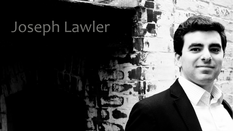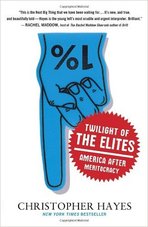Written four years ago, this short book from MSNBC host Chris Hayes is more timely now with the rise of Trump and Sanders than it was when it was published.
Twilight of the Elites is a look at the single overarching trend that, from Hayes’ left-of-center viewpoint, is driving all of the dissatisfaction and discord within the political arena and culture today: A loss of faith in authority.
The power elite, Hayes argues, lost the trust of the public with a series of generation-defining errors: The war in Iraq, the sex abuse scandal in the Catholic Church, the financial crisis, Hurricane Katrina, and more.
Hayes depicts the U.S. elite as self-referential, insular, lacking moral bearings, and unduly influenced by the pressures of intra-elite inequality, rather than a sense of obligation to others.
Twilight of the Elites is helpful in explaining why there are so few figures today capable of speaking with authority on any given topic. The lack of credible figures in positions of influence and power goes a long way in explaining why the U.S. is increasingly divided in terms of politics, culture, and religion, and why right now there are many people who favor anti-establishment candidates like Sanders and Trump merely because they are anti-establishment.
It is broadly in keeping with the argument that the U.S. is undergoing repatrimonialization, meaning that the country’s institutions, more and more, are set up for self-dealing rather than maintaining order and promoting the common good.
Yet where the book could have offered more, in my opinion, is in the definition of the elites, and which specific people should be held accountable for the public trust.
At times, Hayes’ supposition is that the elite are the people involved in running important institutions, such as political offices, the media, religious organizations, and schools.
That make sense to me, but Hayes runs into a bit of a chicken-or-egg problem in stating what the responsibilities of those people should be. For instance, he uses his own high school, the exclusive but public Hunter College High School in New York, as an example of elite failure, because the school is admitting fewer children from certain socioeconomic and ethnic groups, and more from advantaged white and Asian families. In my opinion, Hayes did not clearly sort out whether the purpose of elite schools like Hunter is to prepare the best students for public service and to act as responsible elites, or to itself promote equality along socioeconomic lines. There is a tension in those aims that could have been explored more in the book.
At other points in the book, however, Hayes appears to lean toward the definition of “elite” as tied up in money, and particularly in the 1 percent or 0.1 percent that seems to be enjoying greater economic success than other segments of society. This definition of elite is at work in his discussion of “fractal inequality,” the separations between the merely well-off and the wealthy, and the wealthy and the plutocrats, that generates a keep-up-with-the-joneses dynamic that causes the elite to lose sight of their obligations to normal people. It’s also apparent in his concluding chapter, when he recommends taxation on high incomes as part of the antidote to the problems he diagnoses.
Those arguments may make sense on their own. But it seems like a stretch to attribute the failures of the Catholic hierarchy or the media to high-level inequality. Whatever advantages Catholic bishops might have, for example, massive incomes are not among them. We still expect a certain standard of conduct from them all the same.
And do the ultra-wealthy appear to be more self-interested and self-dealing than in times past? That is not obvious to me. For example, Bill Gates seems, to me at least, to be a public-spirited and generous person interested in addressing some of the big problems facing the country and world, even if I might not love everything about the way he made his money or the particular causes he supports.
Furthermore, the best evidence seems to indicate that the separation within society is as much about the divergence between the upper middle class -- the people with education, good jobs, intact families, and some wealth -- and everyone else as it is about globalization’s winners. This even-handed overview from the Brookings Institution’s Richard Reeve’s gets at some of the underlying trends.
By the way, an analysis of Forbes billionaires’ list performed by the University of Chicago’s Steven Kaplan suggests that it’s the upper-middle class, not the plutocracy, that yields the most new billionaires. That is something to consider when assessing the duties and responsibilities of what Thomas Piketty calls the “petits rentiers.”
Twilight of the Elites is a look at the single overarching trend that, from Hayes’ left-of-center viewpoint, is driving all of the dissatisfaction and discord within the political arena and culture today: A loss of faith in authority.
The power elite, Hayes argues, lost the trust of the public with a series of generation-defining errors: The war in Iraq, the sex abuse scandal in the Catholic Church, the financial crisis, Hurricane Katrina, and more.
Hayes depicts the U.S. elite as self-referential, insular, lacking moral bearings, and unduly influenced by the pressures of intra-elite inequality, rather than a sense of obligation to others.
Twilight of the Elites is helpful in explaining why there are so few figures today capable of speaking with authority on any given topic. The lack of credible figures in positions of influence and power goes a long way in explaining why the U.S. is increasingly divided in terms of politics, culture, and religion, and why right now there are many people who favor anti-establishment candidates like Sanders and Trump merely because they are anti-establishment.
It is broadly in keeping with the argument that the U.S. is undergoing repatrimonialization, meaning that the country’s institutions, more and more, are set up for self-dealing rather than maintaining order and promoting the common good.
Yet where the book could have offered more, in my opinion, is in the definition of the elites, and which specific people should be held accountable for the public trust.
At times, Hayes’ supposition is that the elite are the people involved in running important institutions, such as political offices, the media, religious organizations, and schools.
That make sense to me, but Hayes runs into a bit of a chicken-or-egg problem in stating what the responsibilities of those people should be. For instance, he uses his own high school, the exclusive but public Hunter College High School in New York, as an example of elite failure, because the school is admitting fewer children from certain socioeconomic and ethnic groups, and more from advantaged white and Asian families. In my opinion, Hayes did not clearly sort out whether the purpose of elite schools like Hunter is to prepare the best students for public service and to act as responsible elites, or to itself promote equality along socioeconomic lines. There is a tension in those aims that could have been explored more in the book.
At other points in the book, however, Hayes appears to lean toward the definition of “elite” as tied up in money, and particularly in the 1 percent or 0.1 percent that seems to be enjoying greater economic success than other segments of society. This definition of elite is at work in his discussion of “fractal inequality,” the separations between the merely well-off and the wealthy, and the wealthy and the plutocrats, that generates a keep-up-with-the-joneses dynamic that causes the elite to lose sight of their obligations to normal people. It’s also apparent in his concluding chapter, when he recommends taxation on high incomes as part of the antidote to the problems he diagnoses.
Those arguments may make sense on their own. But it seems like a stretch to attribute the failures of the Catholic hierarchy or the media to high-level inequality. Whatever advantages Catholic bishops might have, for example, massive incomes are not among them. We still expect a certain standard of conduct from them all the same.
And do the ultra-wealthy appear to be more self-interested and self-dealing than in times past? That is not obvious to me. For example, Bill Gates seems, to me at least, to be a public-spirited and generous person interested in addressing some of the big problems facing the country and world, even if I might not love everything about the way he made his money or the particular causes he supports.
Furthermore, the best evidence seems to indicate that the separation within society is as much about the divergence between the upper middle class -- the people with education, good jobs, intact families, and some wealth -- and everyone else as it is about globalization’s winners. This even-handed overview from the Brookings Institution’s Richard Reeve’s gets at some of the underlying trends.
By the way, an analysis of Forbes billionaires’ list performed by the University of Chicago’s Steven Kaplan suggests that it’s the upper-middle class, not the plutocracy, that yields the most new billionaires. That is something to consider when assessing the duties and responsibilities of what Thomas Piketty calls the “petits rentiers.”


